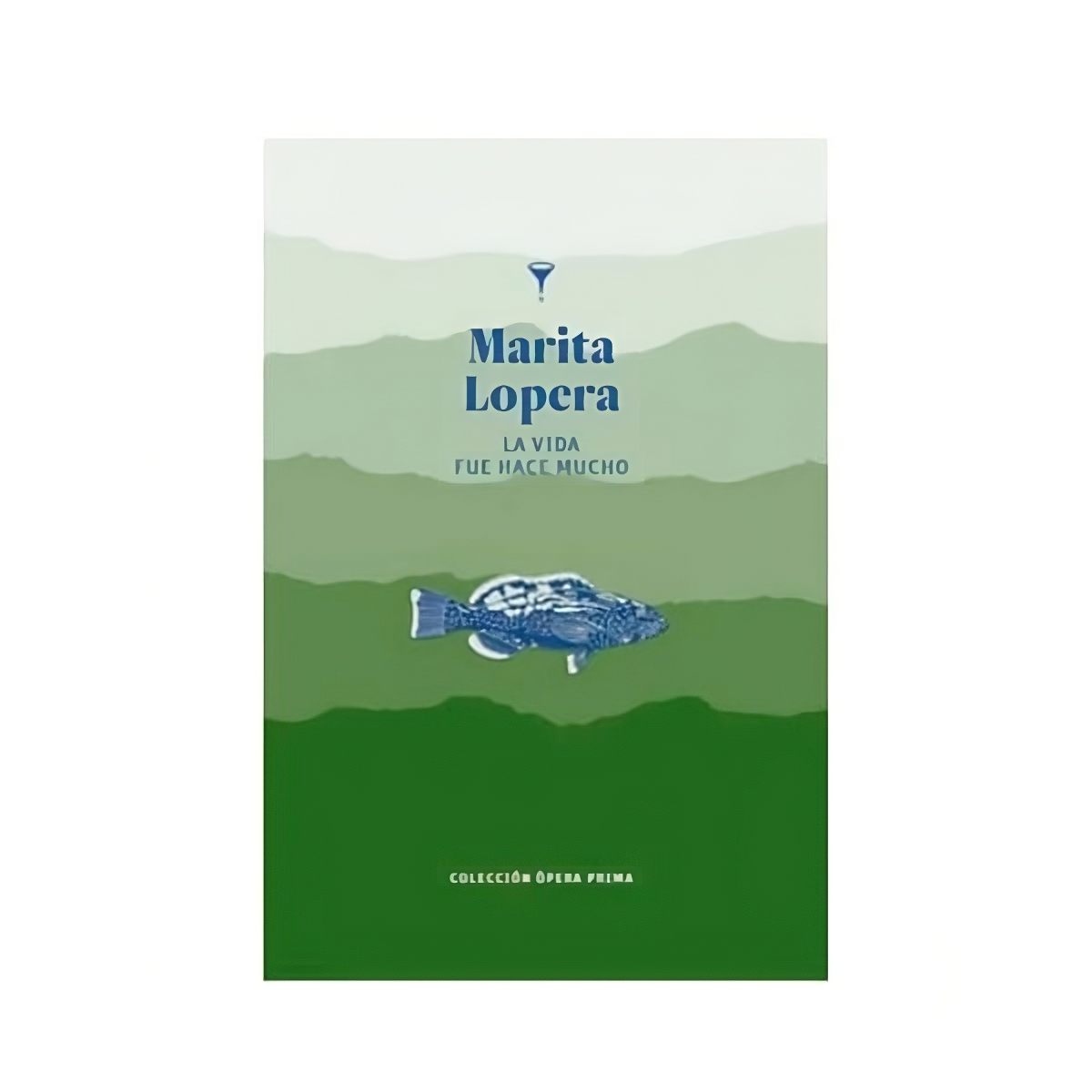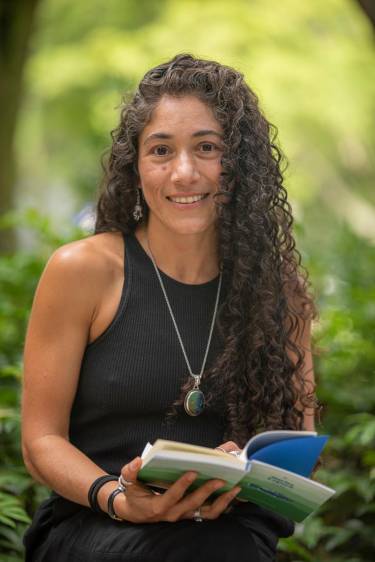The first novel by the Colombian writer Marita Lopera It has a special force, not so much because of the story it tells, but because of the way it tells it. A taciturn musicality takes over the prose and from the moment the reader faces the first lines the act is done.
The story of “Life was long ago”title published by the label narrow editorsdirected by the also writer Hector Abad Faciolince, is one that is erected as a result of the questions. The first: where does that being go, Alea, who seems to be navigating nowhere by chance?
It may interest you: The Colombian Estefanía Carvajal presents her novel ‘The vanities of the world’: “Our pride and our vanities in the end do not contribute anything”
Alea is the central character of this novel. A woman we see trying to find life in a desert of water. Aboard a nameless ship, she navigates a coastline that, like her memory, has been carved by wear and tear.
After drifting for a while, says the back cover, a single coordinate appears on the map: Cabo Tiburón, that border point where the Colombian Caribbean fades into jungle. The challenge is to arrive, but life was long ago and it is not known how much deterioration a body decimated by hunger can resist.

More dedicated to music and teaching than to writing novels, until before this book, Marita Lopera, whose first name is María Lopera Rendón, was completely sure that her days would pass inside a university. When her novel came to light in 2022, that life of hers was left behind, and like the title of her novel, it has long since passed.
Regarding his literary debut and his first two participations in the Bogotá International Book Fairin editions 34 and 35, the author spoke with Leamos and reflected on the writing process.

— Marita, where did the triggering image of this novel come from?
— The initial image, unlike what usually happens to some writers, did not clearly show me the end of the story, or the route to follow, but it did give me a very clear idea of the specific situation that the character was experiencing, that space-time coordinate in which a character is; He gave me a today, a present, a much more retained time, because things here do not happen quickly, there are only seven days in which this character makes some digressions, some memories.
In this initial moment, which also introduces readers to this grouper, an animal that can grow up to 300 kg. They are also known as groupers and become giant fish. Thinking that this character had to eat this grouper, knowing that it had no more than half a kilo, caused me a feeling of pain. It is there that the character’s first situation occurs, which is intervened by hunger, by that precariousness in food availability, something that throughout the entire novel will make the character suffer a lot. That is his universe, his cosmos.
— It had, then, to be developed in a coastal space.
— We have a somewhat paradisiacal idea of what the sea is. Those of us who live in cities always try to escape from everything and our favorite place is the sea, with its palm trees and seagulls soaring in the skies, but the sea in this novel is quite wild, difficult. It is an environment in which, let’s say, all the research I did was to realize that it is indeed very decimated, that is, it no longer has the wealth that it had about 10-15 years ago, more or less. A wealth that is already very difficult to recover because it has suffered from overexploitation.
That helped me to have a very precise scenario for this character who suffers in his own body what this place suffers, which is nothing more than a real gulf. All the cartographic construction of the work is completely realistic. The best-known places are not named, but it is a strip of coastal territory that is in the Caribbean Sea, the last part of the Caribbean Sea that we have in the American continent where the waters of the rivers meet the waters of the Atlantic Ocean, and where a lot of cultures converge. All this, for me, had a very tragic tone. Understanding that, for example, numbers of dolphins arrived in this gulf 20 years ago and not anymore.
It may interest you: “Sometimes the word and the image are needed”: the writer Juliana Castro Varón about her first book, “Papel sensible”
– What about the language? Because it is one of the great successes of the novel.
— I have always had an affinity with maritime environments and every time I have had the chance to go, I usually go there. I like to listen to people and understand the coastal culture, the food, how it is cooked, how it is grown. But the truth is that for the writing of the novel I did not have the possibility of physically returning to these spaces. When I started working on it, the pandemic got in the way and I had to work from confinement and, therefore, go to a considerable amount of alternate documentation: news, for example, about people who talked about how the sea was taking away their houses; memories of conversations I had had myself that were certainly not meant to be part of a literary work.
Bringing back to memory all those conversations and that listening that at some point I did more unconsciously than anything else, produced in me a kind of exchange. Attached to that, a lot of reading, documentaries and information about science, because in the novel there is also something of that in relation to the language that has to do with that world of navigation.
— Where do the pieces you use to build the characters that populate these pages come from?
— I think that all of them condense a bit of all those conflicts that human beings deal with. Alea in particular, who is the main character of this novel, is looking to take care of what is within her reach, beyond the fact that she is completely abandoned, at the mercy of that solitude that marine life imposes. She is an animal character. She is a predator, but a customary predator, who tries to calm hunger, but without abusing nature’s resources.
In the case of Capi, we could say that he is that authoritarian figure that is present in Alea’s life, in some way, he is like her father. It is not said anywhere, but the reader does intuit something.
On the side of The Scientist, he comes to account for those relationships that are distant, like that of the father with his daughter, but here he is the teacher and his disciple. A much more generous relationship, in any case, where there is mutual teaching and learning. Finally, with La Seño there is a sample of what abandonment and loneliness do to us. He is a character who doesn’t establish dialogue, who doesn’t say thank you, doesn’t say please…
— He has many quiet things.
– Precisely. She is a woman who has had to experience the abandonment of her children and plunge into absolute solitude by the sea, surviving as she can. La Seño is the reflection of all the unlearning around the idea of what it means to have a family, to have someone else to take care of them and feel cared for. For this reason, she is a brusque woman, a bit rude, who has forgotten how to approach her relationships.
It may interest you: “We write about everything that makes us up”: Argentine Mariana Travacio talks about the Colombian edition of “As if forgiveness existed”
— The novel has a special musicality that, beyond the fact that every literary text has its rhythm, really seems to come from a true musical training. There is a kind of surge that supports words.
— It is true that I made an effort to achieve a fairly clear rhythm in the novel. In the construction of each paragraph there is a bet on my part so that the readers feel that there are short rhythms, then other longer ones, where the breath lasts a little longer. There is always a compass, a specific measure between the words and the images with which I was also trying to build a structure. It was a filigree job, quite arduous goldsmithing, moreover, because everything had to sound like the sea itself.
— Like when, as children, we put our ears to the shell of the snail and we thought we heard the waves of the sea hitting the rocks.
– How nice of you to say that. Actually, she was trying to generate something like that, among many other things.
— Everything found here, everything narrated, everything observed, is part of that past that is gone, of that life that was long ago.
— It couldn’t be different. When I found the title of the novel, which lies within it, it was a very beautiful moment, a moment in which Alea is precisely taking an inventory of everything that happened to her, everything she has experienced, her losses, those issues that occur in the middle of that symbiosis that finds space between his body and his nature.
When we think about our childhood, it seems like it was long ago. As the years go by, we really feel the force of time. Saying “last year” today is equivalent to a measure of recent time, but when we were little, that brought with it an enormous distance.
As time passes, many things cease to be, and that allows us to understand that life is very short and that what is worth enjoying is the day to day, the present, not so much what will come tomorrow, beyond that it is always a real concern. The fishermen told me a phrase one day that served as a guide in this novel: “We don’t fish so much today because we think about what our children can catch tomorrow.”
These things seem very simple, but the truth is that when we are very aware that life was a long time ago, we manage to contain ourselves, digest everything and do something worthwhile today. It is necessary to live for today, without losing sight of tomorrow, in the same way that sadness is urgent, to know how we will enjoy joy later.
Keep reading:

